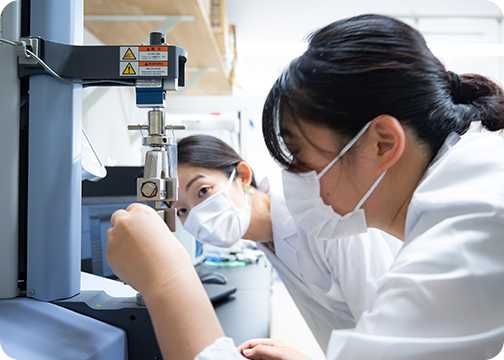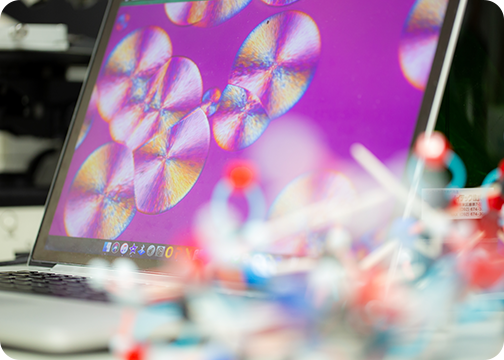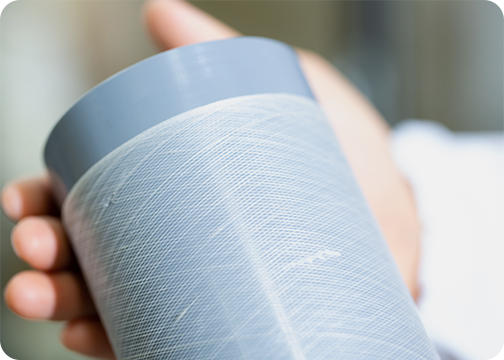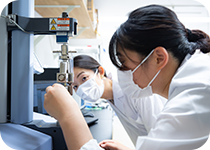ONLINE
ADMISSIONS CONSULTATION
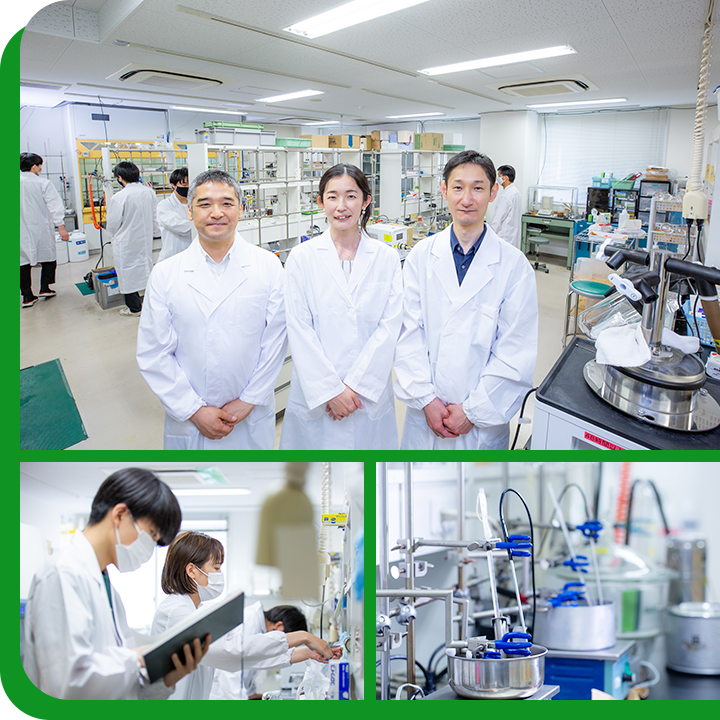
- [Details]
- 1. Introduction of our research and lab activities and discussion
2. Explanation of the admission and discussion
3. Others - [Method]
- Online consultation (In-person is also available if you want.)
- [How to apply]
- Please apply at the following link. We'll get back to you when the date is decided. Please feel free to contact us.
ABOUT US
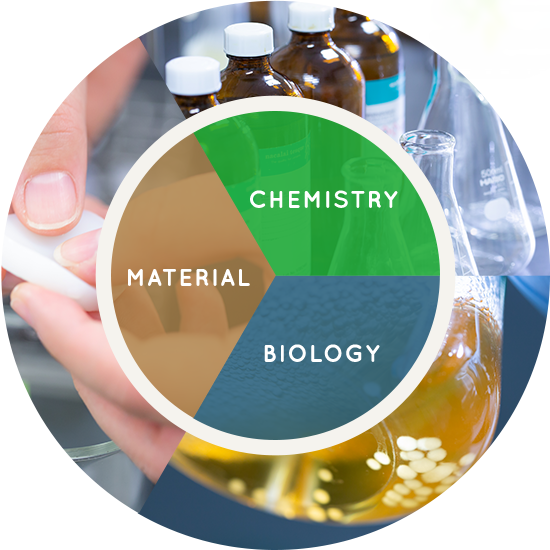
Plastics synthesized from petroleum oil have made our lives more convenient. Recently, however, excessive use of them led to several environmental issues such as global warming and marine plastic waste. As one of the best solutions to the global warming, it is thought to develop a social system using polymeric materials which are equal to or greater than oil-based materials and reduce carbon dioxide emissions. This can be realized by using sustainable biomass instead of petroleum oil as their raw materials. Materials produced from biomass such as plants are named “Biobased materials”. Through education and research of the biobased materials, our department is dedicated to develop human resources who contribute to eco-friendly manufacturing and new material creation.
The process of plant-derived polymeric materials begins with the production of polymerizable monomers from plants using microbes [1]. Next, the monomers are polymerized by chemical reactions so that functional polymeric materials are developed [2, 3]. The monomers produced by microbes do not always have the same structure as petroleum-based ones. Therefore, development of new chemical reactions is occasionally required. In addition to the low-carbon function, they would show new functions unique to plant-derived polymeric materials. The polymeric materials synthesized can be processed into fibers, films, and molded and functional products for commercialization [4, 5]. Furthermore, the precise structures at the nano level and the correlations between structures and physical properties are characterized in order to secure and find unique functions [6].
The research areas of biobased materials are diverse, such as biology, chemistry, and material science.
We welcome all those who are interested in these areas along with resource and environmental issues.
The numbers in the parentheses indicate our labs related to the research fields: 1, Lab of System Engineering for Bio-resources; 2, Lab of Bio-based Materials Chemistry; 3, Lab. of Environmentally Benign Polymeric Materials; 4, Lab of Bio-functional Materials; 5, Lab of Bio-nanofiber; 6, Lab of Properties of Nanomaterials.
FACULTY
Lab. of System Engineering of Bio-resources
-

Prof. Yuji ASO
- RESEARCH TOPICS
- Screening of microbes producing bio-vinyl monomers and it application to development of novel medical polymers
- Sugar production from carbon dioxide using microbes
- KEYWORDS
- Microorganisms / Fermentation / Metabolic engineering / Carbon dioxide / Screening
Lab. of Synthetic and Biomolecular Chemistry
-

Prof. Tomonari TANAKA
- RESEARCH TOPICS
- Chemical and/or enzymatic synthesis of glycomaterials
- Synthesis of functional materials in water
- KEYWORDS
- Organic synthesis / Polymer chemistry / Enzymatic synthesis / Glycotechnology / Glycomaterial
Lab. of Polymer Circular Chemistry
-

Prof. Kazuki FUKUSHIMA
- RESEARCH TOPICS
- Functionalization of degradable polymers based on precise synthesis
- Development of functional materials exploiting self-assembly
- KEYWORDS
- Degradable polymers / Polymer synthesis / Functional materials / Self-assembly / Organocatalysts
Lab. of Bio-basedMaterials Chemistry
-

Assoc. Prof. Takashi AOKI
- RESEARCH TOPICS
- Synthesis of biobased polymers for bio applications
- Evaluation of medical polymers with bio-inert surfaces
- KEYWORDS
- Polymer synthetic chemistry / Biopolymers / Biobased polymers / Material interfaces / Biomaterials
Lab. of Environmentally Benign Polymeric Materials
-

Prof. Ikuo TANIGUCHI
- RESEARCH TOPICS
- Pressure-prosessable polymeric materials
- Polymeric membranes for CO2 capture
- KEYWORDS
- Polymeric materials and science / Polymer synthesis / Membrane separation / CO2 capture
Lab. of Bio-functional Materials
-

Assoc. Prof. Yoko OKAHISA
- RESEARCH TOPICS
- Production and characterization of biobased nanofibers
- KEYWORDS
- Nanocellulose / Fibroin nanofiber / Grass species / Bamboo
-

Assoc. Prof.
Hidekazu YASUNAGA- RESEARCH TOPICS
- Invention of safer hair dyeing techniques
- Functional dyeing & finishing by using biobased materials
- KEYWORDS
- Safer hair dyeing / Dyeing / Finishing / Bio-colourant / Bio-reductant
-

Assoc. Prof. Isao WATAOKA
- RESEARCH TOPICS
- Structural characterization of solutions and gels of cellulose lignin and food polysaccharides
- KEYWORDS
- Cellulose / Lignin / Food polysaccharide / Solution / Structural characterization
Lab. of Bio-nanofibers
-

Asst. Prof. Huaizhong XU
- RESEARCH TOPICS
- Fabrication and characterization of electrospun bio-nanofibers
- KEYWORDS
- Melt electrospinning / Electro-centrifugal spinning / Melt electrowritig / 3D scaffold / Nanofibers
Lab. of Propertiesof Nanomaterials
-

Prof. Shinichi SAKURAI
- RESEARCH TOPICS
- Structure and properties of multiphase biobased polymeric materials
- KEYWORDS
- Polymer blend / Block copolymer / Polymer crystallization / Small-angle X-ray scattering / Pattern formation by convection
-

Prof. Sono SASAKI
- RESEARCH TOPICS
- Structure investigation of marine biodegradable/biobased polymer thin-films and organic-inorganic hybrid nanosheets
- KEYWORDS
- Polymer structure science / Synchrotron structure science / Biodegradable polymers / Biobased polymers / Crystal
-

Assoc. Prof. Hironori MARUBAYASHI
- RESEARCH TOPICS
- Structure and properties of crystalline biobased polymeric materials
- KEYWORDS
- Hierarchical structure / Crystal structure / Diffraction & scattering method / Polymer properties / Biobased polymers
ACCESS
Address: 1 Hashigami-cho, Matsugasaki, Sakyo-ku, Kyoto 606-8585, JAPAN
S215, Bldg. No. 14, Kyoto Institute of Technology (Office)
TEL: +81-75-724-7887
FAX: +81-75-724-7547
- From "Kyoto" Station
- Take the “Kokusai Kaikan” bound Karasuma Line Subway to “Matsugasaki” Station, and walk east for about 8 minutes.
- From "Sanjo Keihan" Station
- Take the “Uzumasa Tenjingawa” bound Tozai Line Subway to “Karasuma Oike” Station, change the trains the “Kokusai Kaikan” bound Karasuma Line Subway to “Matsugasaki” Station, and walk east for about 8 minutes.

